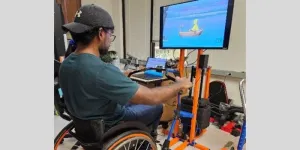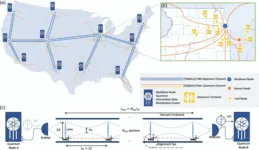(Press-News.org) AI can help humanitarians gain crucial insights to better monitor and anticipate risks, such as a conflict outbreak or escalation. But deploying systems in this context is not without risks for those affected, a new study warns.
Humanitarian organisations have been increasingly using digital technologies and the Covid-19 pandemic has accelerated this trend.
AI-supported disaster mapping was used in Mozambique to speed up emergency response, and AI systems were used to predict food crisis and rolled out by the World Bank across twenty-one countries.
But the study warns some uses of AI may expose people to additional harms and present significant risks for the protection of their rights.
The study, published in the Handbook on Warfare and Artificial Intelligence, is by Professor Ana Beduschi, from the University of Exeter Law School.
Professor Beduschi said: “AI technologies have the potential to further expand the toolkit of humanitarian missions in their preparedness, response, and recovery.
“But safeguards must be put in place to ensure that AI systems used to support the work of humanitarians are not transformed into tools of exclusion of populations in need of assistance. Safeguards concerning the respect and protection of data privacy should also be put in place.
“The humanitarian imperative of ‘do no harm’ should be paramount to all deployment of AI systems in situations of conflict and crisis.”
The study says humanitarian organisations designing AI systems should ensure data protection by design and by default to minimise risks of harm – whether they are legally obliged to do so or not. They should also use Data protection impact assessments (DPIAs) to understand the potential negative impacts of these technologies.
Grievance mechanisms should also be established so people can challenge decisions that were either automated or made by humans with the support of AI systems if these adversely impacted them.
Professor Beduschi said: “AI systems can analyse large amounts of multidimensional data at increasingly fast speeds, identify patterns in the data, and predict future behaviour. That can help organisations gain crucial insights to better monitor and anticipate risks, such as a conflict outbreak or escalation.
“Yet, deploying AI systems in the humanitarian context is not without risks for the affected populations. Issues include the poor quality of the data used to train AI algorithms, the existence of algorithmic bias, the lack of transparency about AI decision-making, and the pervading concerns about the respect and protection of data privacy.
“It is crucial that humanitarians abide by the humanitarian imperative of ‘do not harm’ when deciding whether to deploy AI to support their action. In many cases, the sensible solution would be not to rely on AI technologies as these may cause additional harm to civilian populations.”
END
AI can support humanitarian organizations in situations of armed conflict or crisis - but they should understand the potential risks, study warns
2024-07-09
ELSE PRESS RELEASES FROM THIS DATE:
Speech Accessibility Project’s three newest partners are dedicated to people with cerebral palsy
2024-07-09
The Speech Accessibility Project is partnering with several organizations who serve people with cerebral palsy as it recruits more participants for its speech recognition technology work. They include ADAPT Community Network, the Cerebral Palsy Foundation and CP Unlimited.
The project is recruiting U.S. and Puerto Rican adults with cerebral palsy, amyotrophic lateral sclerosis, Down syndrome, Parkinson’s and those who have had a stroke. Funded by Big ...
UT Arlington increases interdisciplinary grants by 40% in 2024
2024-07-09
The Office of the Vice President for Research and Innovation at The University of Texas at Arlington has awarded seven Interdisciplinary Research Program (IRP) grants totaling nearly $140,000 to foster collaboration between groups that do not typically work together. This represents an increase in funding of 40% over the grants awarded in 2023.
“UT Arlington has increased its support of interdisciplinary research as we know that many of today’s great societal challenges ...
MIT researchers introduce generative AI for databases
2024-07-09
CAMBRIDGE, MA — A new tool makes it easier for database users to perform complicated statistical analyses of tabular data without the need to know what is going on behind the scenes.
GenSQL, a generative AI system for databases, could help users make predictions, detect anomalies, guess missing values, fix errors, or generate synthetic data with just a few keystrokes.
For instance, if the system were used to analyze medical data from a patient who has always had high blood pressure, it could catch a blood pressure reading that ...
Exponentially increasing understanding of early life on Earth
2024-07-09
Despite decades of research, there’s still much scholars don’t understand about life’s beginnings and early evolution. A UC Riverside paper has opened the door to understanding more and to framing future studies that could help predict climate change and search for life beyond Earth.
“This paper strives to inform the Earth sciences community where the research needs to go next,” said Christopher Tino, a UCR PhD candidate during the time of research and a first author.
Many studies have explored signs ...
New method could yield fast, cross-country quantum network
2024-07-09
Quantum computers offer powerful ways to improve cybersecurity, communications, and data processing, among other fields. To realize these full benefits, however, multiple quantum computers need to be connected to build quantum networks or a quantum internet. Scientists have struggled to come up with practical methods of building such networks, which must transmit quantum information over long distances.
Now, researchers at the University of Chicago Pritzker School of Molecular Engineering (PME) have proposed a new approach — building long quantum channels using vacuum sealed tubes ...
Aging retinal pigmented epithelium: Omics-based insights into vision decline
2024-07-09
“These findings potentially support employing anti-aging therapies such as senolytic pharmacologic compounds to prevent or ameliorate progression to AMD [...]”
BUFFALO, NY- July 9, 2024 – A new editorial paper was published in Aging (listed by MEDLINE/PubMed as "Aging (Albany NY)" and "Aging-US" by Web of Science) Volume 16, Issue 12, entitled, “Aging retinal pigmented epithelium: omics-based insights into vision decline.”
In this new editorial, researchers Ioan V. Matei and Luminita Paraoan from ...
Public health researchers detail way forward post-pandemic
2024-07-09
AURORA, Colo. (July 9, 2024) – In the aftermath of the COVID-19 pandemic, the U.S. public health system must focus on critical questions of accountability, politicization and updating data systems if it is to do its job well and maintain the trust of the American people, according to a new report from the Colorado School of Public Health.
The report, authored by Professor Jonathan Samet, MD, MS, of the Colorado School of Public Health and Professor Ross Brownson, PhD, of Washington University in St. Louis, was published recently in the journal Health Affairs.
In ...
Improving 'health span' through slowing age-related cognitive decline
2024-07-09
Two University of Oklahoma researchers have been awarded more than $2 million in grants from the Hevolution Foundation to further their studies on age-related cognitive impairment, with an emphasis on improving “health span,” or the number of years a person remains healthy.
While modern medicine can help extend a person’s life span, researchers are increasingly studying ways to increase their healthy years of life. Because the process of aging increases the risk for memory problems and dementia, researchers must understand why as a first step toward delaying cognitive issues until later in life. The Hevolution Foundation ...
Globally significant upwelling is driven by topographical features on seafloor
2024-07-09
Irvine, Calif., July 9, 2024 – Exactly how the turbulent mixing of ocean water relates to global overturning circulation has been little understood by oceanographers, but an international research team, including an Earth system scientist at the University of California, Irvine, has found that bumpy topographical features along the sloping ocean floor contribute significantly to ocean seawater upwelling.
In a paper published recently in Nature, the researchers describe a “vigorous near-bottom upwelling” that results in the upward transition of water from denser to lighter ocean layers at a rate ...
Dolls and trucks: Political right and left share some parenting beliefs
2024-07-09
Key takeaways
Virtually all study respondents on the political left and more than 75% on the right supported allowing children to play with both traditionally “girl” and “boy” toys.
Those on both sides of the political spectrum also supported the idea that girls should be able to aspire to traditionally male pursuits.
However, while most left-wing activists supported the idea of a child living in a way that does not align with their birth sex, most right-wing activists rejected the idea.
Society appears deeply divided on how to parent with regard to gender.
For example, some parents throw “gender reveal” ...




